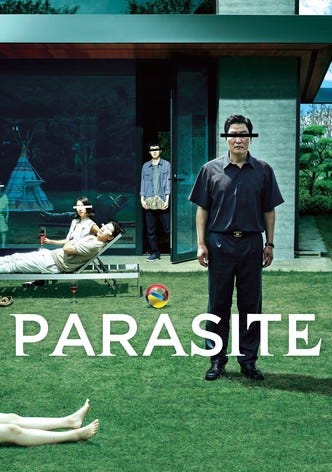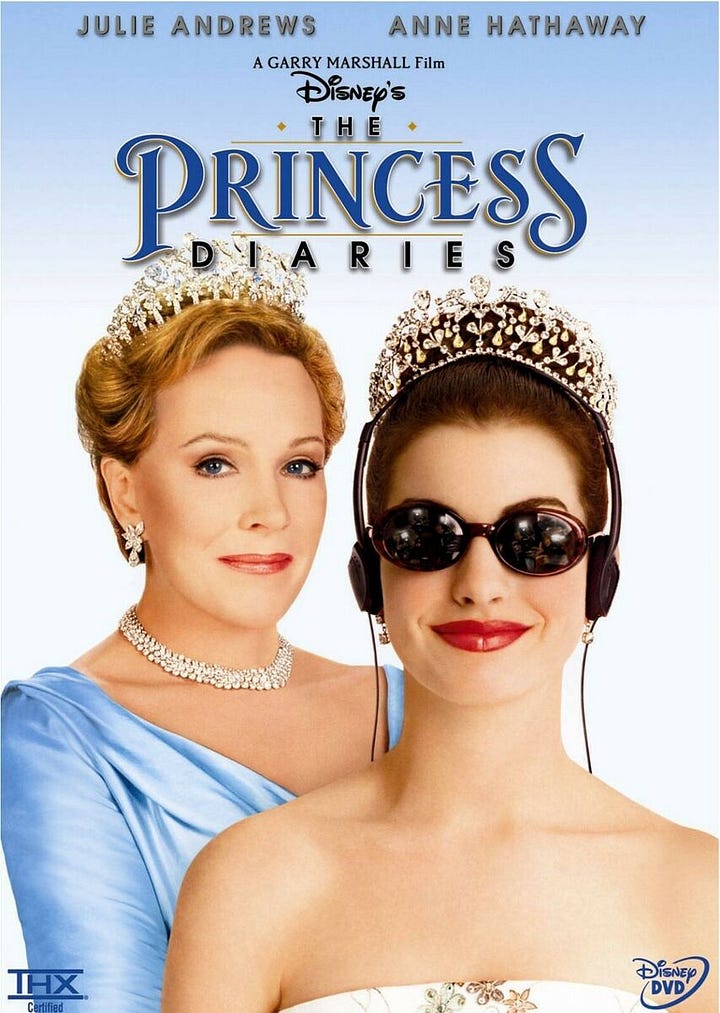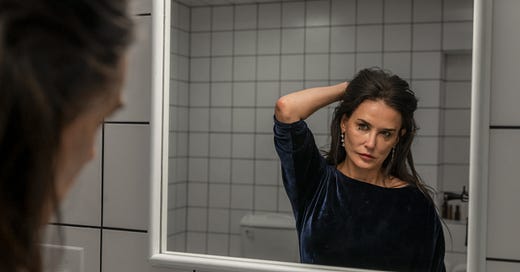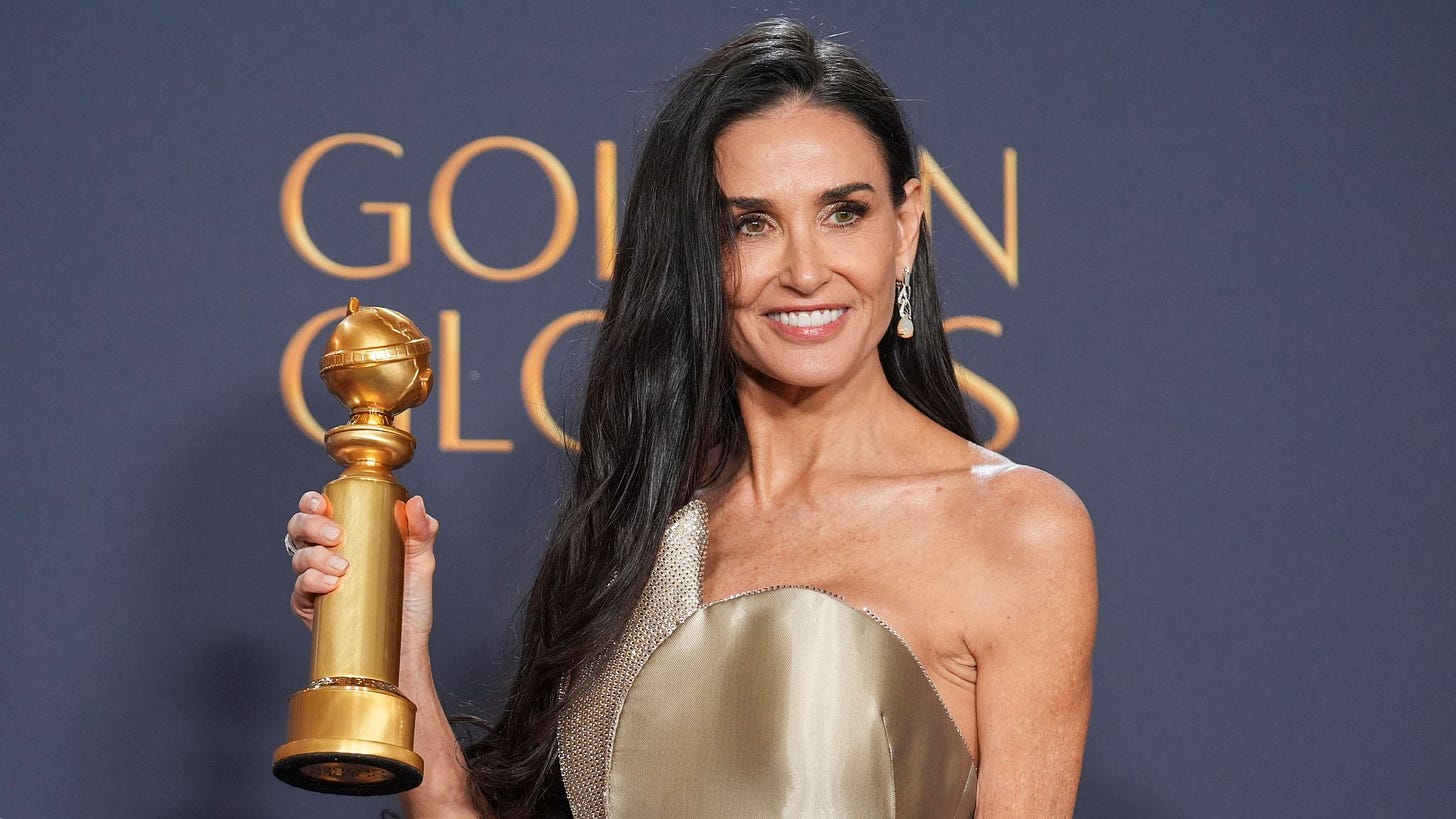The Difference Between a Film and a Movie 🎥
You don’t have to like something to appreciate it.
Just in time for the Oscars!
The first thought I had while watching The Substance last weekend came to me easily. I like this shot. It was not revolutionary, but it was something. A bird’s-eye view of a slab of concrete, or pavement. Gray, maybe marbled. A Hollywood star being built, being celebrated, being walked over, being pummeled by people, touched by seasons, temporarily stained by someone’s messy hot dog falling from their hands.
The next few were just as interesting. Demi Moore as newly 50-year-old Elisabeth Sparkle, walking down a dramatically long hallway with posters from her early career as the successful and beautiful television host of an aerobics program, while person after person tells her to have a happy birthday and she tries not to wince each time. Dennis Quaid as Harvey, a television executive that oversees Sparkle’s show, using the urinal in the men’s restroom as he spits into his cell phone how he needs to replace her with someone younger. Harvey, telling Sparkle this while he chews on crawfish with an open mouth across from her at a business lunch.
The first thought or thoughts you have while watching anything says a lot — if not everything —about what you are about to experience. And I knew from these first few moments that regardless of whether or not I would like The Substance by the end of it, I was going to pay attention.
There is one question that has plagued me since I was a wee girl, and I often wonder if it plagues others as well. “What is your favorite movie?” people began to ask towards the end of primary school. My favorite color? It changed every month, but my options were pretty clearly laid out for me. My favorite food? More options to choose from, but definitely macaroni and cheese, until it became tacos, until it became spaghetti. But my favorite movie? Now, miss. I need to know what exactly you mean by that.
More than a color or a food, a movie feels more prescriptive about who you are.
Mean Girls (2004) was obviously the answer. I knew when I went to see it in the fourth grade with my mom (bestie did not fully understand what she was taking her 9-year-old daughter to see lol) that I was experiencing something. I was dazzled by the acting and characters and dead pan comedic one-liners, of course, but I remember thinking (and later finding the language to say): this is a deeply clever way to highlight the politics of (albeit, a very white) high school.
But as I grew older, I began thinking, well, maybe it shouldn’t be my favorite movie. My answer should probably be more “sophisticated” (whatever that means). So for years, I pretended Mean Girls wasn’t my truth. When studying digital video and cinema in early 2010’s, a professor used a clip from American Beauty (1999) to teach us the art of a powerful dinner scene. I didn’t know I could be so captivated by two minutes and 29 seconds of dialogue and barely any blocking – or blocking so subtle I had hardly noticed it. So I decided this would be my new favorite movie.1
It was just “artsy” enough, but not obnoxiously lofty or hard to understand. It was familiar, but not “too” mainstream. It made me think. It made me feel. It made me appreciate.2 I consider myself someone who doesn’t get too wrapped up in other people’s opinions, but clearly, I am a person who can’t escape living in a society fueled by judgement or fear of it!
When people asked, “What’s your favorite movie?” it made sense that my answer was, I need to know what exactly you mean by that. Because this was serious business. More than a color or a food, a movie feels more prescriptive about who you are. Mean Girls, as an answer, reflected my sense of humor and personality but my innate and ever-present desire to read between the lines to understand what something is really saying about, well, everything. American Beauty, as an answer, reflected themes I am drawn to and like to explore in art: identity and personal expansion. When I put it this way, what I like about them are one and the same. But as I grew older once again, not having to forsake one, I would soon change my follow-up to: My favorite movie? Or my favorite film?


To me, both were important, but one was a movie and one was a film. A movie, by my definition, is the baseline. It’s a story on screen. It’s a series of moving images made to be consumed by a person or people; a motion picture. It can be light-hearted or serious, a comedy or a drama. Genre alone does not define a motion picture being a movie or a film.
A film is a movie squared. Not because it’s better, but because of the sheer amount of additional intentions and choices that go into it. It’s the difference between a bride saying, “I don’t care which color napkins we choose. I’m just excited to get married,” and “I want the napkins to be light blue so they visually tie in with the florals and the bridesmaids dresses. And I’m excited to get married.”
One wedding is not bad or good, right or wrong, or better or worse than the other. One just wants to tell the story; to do the thing and have everyone there to witness it. The other wants to tell the story; to do the thing and have everyone there to witness it. But they care deeply about the details because they believe that the details communicate something additional about their relationship, or about their beliefs, or about their taste, or about who they are.
Trying to parse out what makes something a movie vs. a film is a fun little exercise.
Mean Girls was a movie because the camera is there to tell a story and that’s it. It’s clever and smart and brilliant and fun. It’s not that movies don’t care. (Although some clearly don’t.) But there are no hidden messages in what you’re seeing. What you see is mostly what you get. And that’s great!
American Beauty was a film. In a film, the camera is a character communicating something to us. We learn more about what we are seeing because of it. A movie uses a camera to capture a story. A film uses the camera to tell a story. (In The Substance, the “It changed my life” note took on a different meaning when it appeared later in the movie.)
A movie can contain complexity, of course, but is typically more easily digestible, visually and otherwise. Like, um, soup. (I fucking love soup.) A film wants you to pore over it; to chew on it like a bone and spit it out because you hate it, or to close your eyes and taste each flavor because it’s the best damn thing you’ve ever had. (And I live for a five-course meal with a cocktail pairing!)
There could be good movies, and really bad films. Just because something was a film didn’t mean it was good, and just because it was a movie didn’t mean it was bad. It was just the difference between a rectangle being a square, but a square not being a rectangle. These were my made up rules. And the rules, I found, provoked some really interesting and exciting conversations.
The Substance, I knew in its first minute, was a film. The opening overheard shot wasn’t just showing me a Hollywood star. It was communicating the passing of time; how things age but also remain. Watching Sparkle walk down that dramatically long hallway felt as suffocating as it looked, because they used a telephoto lens to create a distinct cinematic look often used to enhance dramatic tension, draw attention to a subject, or create a surreal feel. Using a fish eye lens when Harvey is at the urinal made it look like he was peeing on the camera, and therefore, like we the audience were pee-ons and could relate to Sparkle, the main character. Crawfish as Harvey’s lunch order, and how he eats them wide-mouthed and without regard, emphasizes his character’s obnoxiousness. Even the clever choice of it being a food with a shell that’s discarded … it communicates an additional meaning for us to feast on.
I’m only using The Substance as an example because it’s the latest film I’ve watched and is fresh in my mind (My friend and Substacker
wrote about so eloquently here). Whether I liked it or not doesn’t matter. What matters is that I noticed these decisions; that I appreciated them for enhancing the story in a secondary way.Trying to parse out what makes something a movie vs. a film is a fun little exercise. When a few friends and I sat on my couch and argued whether certain titles were a film or a movie, it was such a good time. (Dune had us going). The “Is it a film or movie” game could keep you entertained for hours. Try it.
Maybe it’s less about liking them, or not liking them, but witnessing them.
But in the process of writing this, and over the past week stewing on all of this, I realized something. Whether something is a film or a movie, like most things in life, is not so black or white and is more of a spectrum. Whether something is a film or a movie is personal. And kind of unfair.
Even now, as I type this, the distinction I made up in my head for fun all those years is hard to describe. Maybe that’s because it’s not real. Because visual stories cannot and should not fall into binaries.
Maybe it’s less about films vs. movies and movies vs. films, and more about the vast range of storytelling and what it can achieve or impart. Maybe it’s less about liking them, or not liking them, but witnessing them. Noticing. Answering the call. Listening, trying to understand what it’s saying.
Maybe it’s more about American Beauty achieving one thing in one way, and Mean Girls achieving one thing in another. Maybe it’s more about American Beauty speaking to one side of me and Mean Girls speaking to another. Maybe it’s more about the different ways you can soak into a visual story — with ease or with effort — and glean meaning from it.
The first thought you have while watching anything says a lot — if not everything —about what you are about to experience. It’s not necessarily a first impression, or a final one. It’s not damning, but it’s also not irrelevant. All it’s inviting you to do is watch for the light blue napkins. Or to lose yourself on the dance floor and party. Or both.
Who’s watching the Oscars tonight? Leave a comment letting me know who or what you’re rooting for (or against)!
Thanks for reading In Deep with Mia Brabham Nolan! Subscribe to receive all new posts, or become a paid subscriber to help support my time and work. This essay was edited by the wonderful Rebecca Snow. All silly little opinions are my own.
Hi there! My name is Mia Brabham Nolan and I’m a writer by day and by night, currently living in New York City. I write the entertainment, music, and culture Substack newsletter In Deep with Mia Brabham Nolan. I’m on Instagram @yourstrulymia. Leave a comment with your thoughts or saying hi and I’ll always respond. Thanks for reading :)
This was before we all found out about Kevin Spacey being a turd! Men ruining everything, per usual!
I love a controversial movie take, and I have one about American Beauty! It’s not my favorite movie anymore, but I do think it’s often boiled down to being “creepy” (a middle-aged man lusting after his daughter’s friend), and that is true, but I think there are a lot of rich lessons and realizations to be taken from the story that people miss because they get hung up on that single aspect of it. The core of the story, to me, is a person who realizes he’s unhappy and takes the steps to uncover what happiness might realistically look like for him for the first time in his life (including quitting his corporate job to flip burgers). That’s worth exploring.







Love this Mia!! This makes me think of how people think of a Burger vs a Hamburger. They both can be delicious but are built and presented differently, which makes you feel a certain way about each.
Mia! I love this!! I was just talking the other day with my book club, and also with some fellow writer friends...in the similar vein of movie vs film - I separate good writing from my personal subjective criticism of what I like. I know a good writer, good/great writing when I see it, but I don't necessarily like it, maybe. For example, I just finished "One Hundred Years of Solitude." Was the writing excellent? Yes. Did I love the book? No. But I do respect it. I like that art has these nuances, that things can be so personal but also, in some ways, very objective in its subjection if that makes sense lol